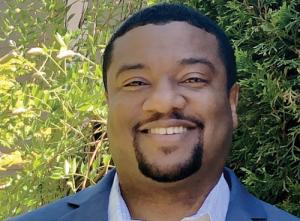Portland General Electric
Quintin Gaddis is Senior Manager, Substation and Meter Operations at Portland General Electric.
PUF readers know we love staff at all our member organizations. PUF digs deep to give insight to how staff got there, what they do, how they do it, and what advice they have. When a utility like Portland General Electric allows access to two rising stars that help make all the wonderful work happen, PUF wants to know more. You want to listen in on these two engaging talks with Kellie Cloud and Quintin Gaddis, who are sure to be around for a long time and sure to go far.

PUF's Steve Mitnick: Before coming to Portland General, you went into the Air Force, and now you're in the Air Force Reserves. What led you to join the Air Force?
Quintin Gaddis: I had two uncles in the Air Force. They loved it. One retired from the Reserves. Both of them got their education through the Air Force. I was at a time in my life when I was looking for structure and wanted to move forward, grow, get out there, and be challenged. I followed the same path they did. They got everything out of the Air Force they possibly could.
PUF: You earned an associate degree first in electrical engineering technology, a bachelor's in avionics, then an MBA.
Quintin Gaddis: Yes. I pursued my education because it was honing some of the skills I already had. I always want to know how something works, and I want to grow.
When I got into management, I didn't know about budgeting, but I wanted to learn. All of those opportunities were learning experiences and they helped me. That helps me now in the day-to-day, in work, and in life.
PUF: What was your job in the Air Force?
Quintin Gaddis: I was an aircraft mechanic initially. I worked on the C-5. In the Reserves I became a flight control specialist on the C-141 and the C-5. After that, I moved into the Air National Guard, got into civil engineering, and then moved back to the aviation side.
PUF: The C-141 and C-5 are not small planes.
Quintin Gaddis: Yes, they are large cargo planes. I was on the C-17 as well. The C-5 right now is one of the largest ones that we have �" mostly in the Air Force Reserves. The Command C-17 kind of took the place of the C-141 and the C-5. It was an exciting experience.
That big airplane became a city, so when I look at my electrical industry career, everything that I deal with in a substation or in my career was all on that airplane.
PUF: What led you to the utilities industry?
Quintin Gaddis: It was by accident. I realized once I got into the industry that everything from the Air Force had provided a foundation. I applied for an officer commission in the Air Force when I was at the McChord Air Force base in Washington, and then I needed to get home. That's kind of what got me into the Reserves. I started working for a company called Air Products & Chemical.
I realized the concept of the air separation profession was closely associated to how an aircraft engine operated. I started learning how to run the plant and then learned more about the substation piece within the industry, the electronics, and controls, it just kept going back to my aviation experience.
I realized that the power industry was nothing but an aircraft engine. When I thought about a power plant, I thought about an aircraft engine turned upside down, essentially. To me, that was a power plant. I was part of building our substation for one of the plants. I thought, wow, once this is over, I'm going to utilities.
I was intrigued by the project I was on with substations. I talked to a few people who said, you live in Dayton, so why don't you go talk to Dayton Power & Light?
Dayton Power & Light gave me an opportunity and I latched onto an individual named Steve Clemans who became a mentor. He helped me bring everything together and allowed me to take everything I had from the military, Air Products, and my career, and put it together within the industry.
That got me interested in getting my certification, and then being a system operator.
I grew from there.
Everything I do starts with safety. With safety, it's having great training to perform the job. There's structure behind everything I do, along with policy and procedure. I got all of that from the Air Force.
PUF: You're the senior manager of substation and meter operations, and utilities is one of the most critical positions. Talk about what you've done at Portland General Electric and what your job is like.
Quintin Gaddis: My job is absolutely amazing. It changes every day. It's safety first. My job is to ensure that the group I have does our job with safe and efficient power transformation from the power plant all the way to the customer.
Along the way there, from substations, there's that protection we are responsible for. Any time you have a car that hits a pole, or you have a tree that's laying on a limb, we're responsible for that protection at the substation to operate and ensure there isn't any further damage within the infrastructure, whether it's burning down a line or continuing or causing a sustained long-term outage.
We ensure any time there's an outage, the protection schemes we implement isolate the outage to a small section to prevent large quantities of people being out. There are a lot of things that go into it from the power plants.
We're in the power plants, and the power stations. We work with the apparatus out on the distribution lines. We work with everybody from our system operating group. I was a system operator, so it's great to be able to communicate with them about line operations.
It's one of those jobs where there are multiple things we're responsible for within the industry. It's an exciting opportunity, and every day is different. The people are what make it special.
PUF: You had maybe a little too much excitement in February. I don't know if you like cold weather, but you had tough weather. How did that go?
Quintin Gaddis: We did have a tough time. With the historic storms that we had here, our system was challenged. The customers were put in a situation where they had to trust us. They had to trust us to do everything we could to ensure we got the power back on for them so they could get their lives back to normal.
It reminded me why I came into the business. Every day was tough. We didn't have a lot of happy customers because it was all about the human element. But they understood what we had to do to make the system right during the restoration process.
We were challenged, but this is what I signed up for. There's a lot of pressure in the job. But it's all about doing everything I can for the customer, for the people I support on my team, and ensuring that the infrastructure remains in the best condition.
February was challenging, and it was something I wouldn't want the customer to have to endure again. When mother nature comes in, you're always thinking about the customer. But if we face that kind of challenge in the future, I will step up again and again. That's why I stay in this position.
PUF: What's the most rewarding about your job at Portland General Electric?
Quintin Gaddis: It's all about supporting the great people that work here. They are here supporting the customer. It's an exciting career. I've had some wonderful experiences.
Being able to watch, whether it's a new apprentice that comes in, learning a craft, or seeing how we get the lights back on and restore our customers, and the smiles we see from the customers. It's all about the people.
PUF: Do you have advice for young people just starting out, or for veterans joining the civilian work force?
Quintin Gaddis: First, you have to believe in yourself and in the skills you know that you have. You can't give up. For veterans, everything you go through, from basic training or technical school, to learning the job you're going to do for the military, that's more challenging. That was also more challenging for me than anything.
You can't give up. It's about making sure you do it the right way. There are a lot of challenges you go through in the industry.
Not everybody will like what you do, but as long as you like what you do and continue to do it the right way, eventually people will appreciate it and that will keep you coming back.



